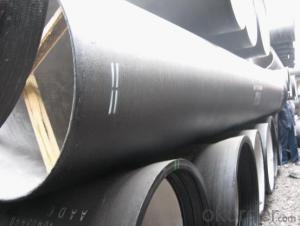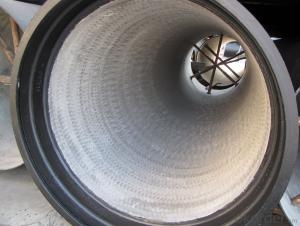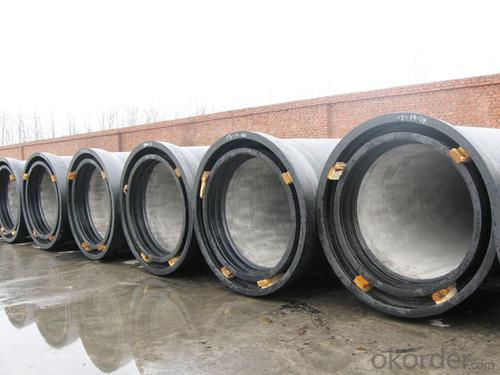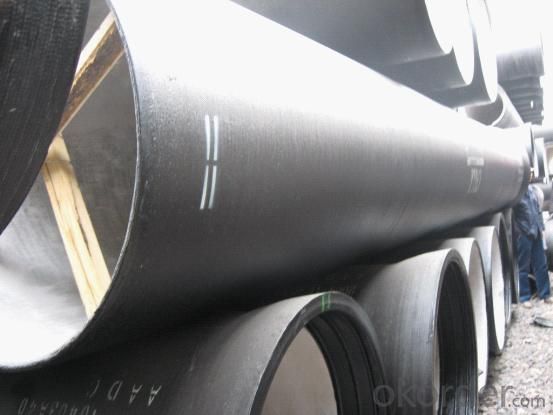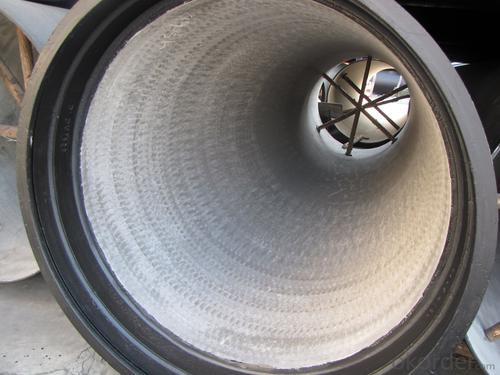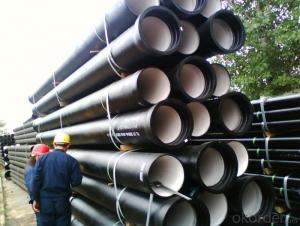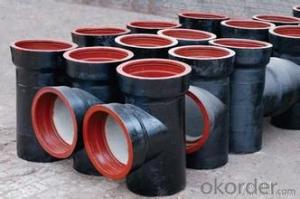Ductile Iron Pipe DN2000 K9
OKorder Service Pledge
Quality Product, Order Online Tracking, Timely Delivery
OKorder Financial Service
Credit Rating, Credit Services, Credit Purchasing
You Might Also Like
Specifications
Quick Details
| Place of Origin: | China (Mainland) | Brand Name: | CMAX | Model Number: | T type / K type / Flange type |
| Length: | 6m / 5.7m / Negotiable | Standard: | ISO2531 / EN545 / EN598 | Application: | Potable / Sewage water |
| Diameter: | DN80~DN2200 | Shape: | Round | Hardness: | 230 |
| Pipe Wall Thickness: | standard | Pull Strength: | 420 | Yield (≥ MPa): | 300 |
| Material: | Ductile Iron | Type: | Centrifugal ductile cast iron pipe | Certification: | ISO2531 / EN545 / EN598 |
| Outer Diameter: | 80-2200 | Thickness: | standard | Specification: | DN80~DN2200 |
| |
The advantages to the customer:
Trustworthy financial strength.
One-stop shopping.
Fast and efficient service.
Coordination of shipments from multiple plants.
Specialists of the overseas shipping process.
A more competitive price.
- Q: What is the maximum operating pressure for ductile iron pipes?
- The maximum operating pressure of ductile iron pipes may vary based on factors like pipe diameter, wall thickness, and the specific usage. Nonetheless, typically, ductile iron pipes are engineered to endure pressures of up to 350 psi (pounds per square inch), and occasionally even higher. It is worth highlighting that to ascertain the precise maximum operating pressure for a specific ductile iron pipe system, one should refer to local regulations, engineering standards, and manufacturer specifications.
- Q: Ductile iron pipe joint damage, water leakage, want to see the connection with other pipe fittings, how to operate?!
- The ink tube is really not good. Oh, have you tried blocking it with cement or plugging it with putty?Just pick up PE haha
- Q: Are ductile iron pipes suitable for installation in areas with high soil compaction?
- Yes, ductile iron pipes are suitable for installation in areas with high soil compaction. Ductile iron pipes are known for their strength and durability, making them highly resistant to external loads and pressures. The material's inherent flexibility allows it to withstand the stresses caused by high soil compaction. Additionally, ductile iron pipes have a high modulus of elasticity, which helps them maintain their shape and structural integrity even under heavy loads. Therefore, they are an excellent choice for areas with high soil compaction, as they can effectively handle the pressure and provide reliable and long-lasting performance.
- Q: What are the typical joint restraint requirements for ductile iron pipes under pressure?
- The typical joint restraint requirements for ductile iron pipes under pressure involve the use of mechanical joint restraints or restrained joint systems. These restraints are necessary to prevent the pipes from separating or pulling apart due to the internal pressure exerted on them. One common type of joint restraint is the mechanical joint restraint, which consists of a series of bolts and clamps that securely hold the pipes together. These restraints are typically applied at each joint of the ductile iron pipes to ensure a tight and secure connection. Mechanical joint restraints provide axial restraint, preventing the pipes from separating in the direction of the pipe axis. Another type of joint restraint used for ductile iron pipes is the restrained joint system. This system involves the use of a specially designed joint that provides both axial and angular restraint. The restrained joint system typically consists of a gasket, a restraining gland, and a series of bolts or wedges. The gasket provides a watertight seal, while the restraining gland and bolts/wedges restrain the pipe joints, preventing separation under pressure. The specific joint restraint requirements for ductile iron pipes under pressure may vary depending on the diameter, wall thickness, and operating conditions of the pipes. It is important to consult the manufacturer's guidelines and industry standards to determine the appropriate joint restraint system for a given application. Additionally, proper installation and maintenance of the joint restraints are crucial to ensure their effectiveness and longevity in restraining the pipes.
- Q: Can ductile iron pipes be used in marine environments?
- Ductile iron pipes are suitable for marine environments due to their excellent mechanical properties, high corrosion resistance, and durability. These pipes are made of a type of cast iron known as ductile iron, which can withstand the harsh conditions of marine environments. Marine environments are known for their high levels of corrosion caused by saltwater, humidity, and other harsh factors. However, ductile iron pipes are specifically designed to endure these conditions. They have a protective layer called the "graphite skin" that acts as a barrier against corrosion. This graphite skin prevents rust formation and safeguards the pipes from degradation. Additionally, ductile iron pipes can be further protected with coatings or linings to enhance their corrosion resistance in marine environments. These protective coatings, such as epoxy, polyurethane, or zinc coatings, provide an extra layer of defense against corrosion. This ensures the pipes' longevity and reliability in marine environments. To maintain optimal performance, regular maintenance and inspection are crucial for ductile iron pipes in marine environments. This includes regular cleaning to remove marine growth or debris that may accumulate on the pipes and conducting routine inspections to identify any signs of corrosion or damage. In conclusion, ductile iron pipes are a suitable choice for marine environments. Their inherent corrosion resistance, durability, and the ability to apply additional protective coatings make them ideal for various marine applications.
- Q: Can ductile iron pipes be used for geothermal heating and cooling systems?
- Geothermal heating and cooling systems can utilize ductile iron pipes, as they possess the necessary strength and durability to withstand the high temperatures and pressures involved. The exceptional corrosion resistance of ductile iron is vital for ensuring long-term functionality when used underground in applications like geothermal systems. Moreover, the high thermal conductivity of ductile iron pipes enables efficient heat transfer within geothermal systems. Therefore, due to their strength, durability, corrosion resistance, and thermal conductivity, ductile iron pipes are a suitable option for geothermal heating and cooling systems.
- Q: Are there any special considerations for installing ductile iron pipe in rocky soils?
- Installing ductile iron pipe in rocky soils presents various special considerations. First and foremost, the excavation process can be a challenge due to the presence of rocks. Trenching becomes more difficult and time-consuming, requiring specialized equipment to break through the rocks and create a suitable trench for the pipe installation. Furthermore, the rocky soil can cause abrasion and damage to the outer surface of the ductile iron pipe during installation. This poses a potential risk to the integrity of the pipe, leading to leaks or breakages in the future. To mitigate this risk, it is advisable to utilize protective measures such as rock shields or padding around the pipe, minimizing direct contact with the rocks. In addition, the presence of rocks can impact the backfilling process. Proper backfilling is essential to provide support and stability to the installed pipe. However, rocks can hinder the proper compaction of the backfill material, resulting in uneven support and potential movement of the pipe. Therefore, it is crucial to carefully select and place the backfill material, ensuring it is free from larger rocks and adequately compacted to provide sufficient support. Moreover, the rocky soil can also affect the installation of fittings and joints. The hardness of the rocks can make it challenging to align and connect the pipe with fittings or create secure joints. Therefore, extra care must be taken during the installation process to ensure proper alignment and secure connections, preventing leaks and ensuring the long-term functionality of the ductile iron pipe system. In conclusion, installing ductile iron pipe in rocky soils demands special attention to overcome challenges related to excavation, abrasion, backfilling, and fitting installation. By taking these factors into account and implementing appropriate measures, the installation process can be carried out successfully, allowing the pipe system to operate effectively even in rocky soil conditions.
- Q: What is the maximum temperature that ductile iron pipes can handle?
- The maximum temperature that ductile iron pipes can handle depends on various factors such as the specific grade of ductile iron, the specific application, and the duration of exposure to elevated temperatures. Generally, ductile iron pipes have a maximum recommended operating temperature of around 400-450 degrees Fahrenheit (205-232 degrees Celsius). However, it is important to consult the manufacturer's specifications and guidelines for the specific product being used as different grades and manufacturers may have slightly different temperature limits. It is also crucial to consider the thermal expansion and contraction characteristics of ductile iron pipes to avoid any potential issues in high-temperature environments.
- Q: How are ductile iron pipes protected against external impact or loading?
- Ductile iron pipes are protected against external impact or loading through various methods and measures to ensure their durability and integrity. Some of the common ways in which ductile iron pipes are protected are: 1. Thickness and strength: Ductile iron pipes are designed with a sufficient wall thickness and high strength to withstand external loads and impacts. This ensures that the pipes can endure heavy loads and resist deformation or cracking. 2. Coatings: Ductile iron pipes are typically coated with protective layers to provide an additional barrier against external impact. These coatings can include cement mortar lining, polyethylene encasement, or epoxy coatings. These coatings not only offer impact resistance but also provide corrosion protection to the pipes. 3. Bedding and backfilling: Proper bedding and backfilling techniques are essential to protect ductile iron pipes from external loads. The pipes are correctly placed and surrounded by suitable materials like compacted granular bedding and backfill, which help distribute the external loads evenly and reduce the risk of pipe damage. 4. Trench design: The design of the trench in which the ductile iron pipes are installed is crucial for protecting them against external impact. The trench dimensions, slope stability, and proper compaction of the backfill are considered to minimize the chances of damage due to external loads. 5. Pipe layout and support: Proper pipe layout and support are vital to protect ductile iron pipes from external impact. Adequate support mechanisms like thrust blocks, pipe anchors, and pipe restraints are employed to absorb and distribute external loads, preventing any damage to the pipes. 6. Protective structures: In areas where there is a higher risk of external impact, additional protective structures are installed to safeguard the ductile iron pipes. These structures can include concrete encasements, bollards, or reinforced concrete slabs, which act as physical barriers against potential impacts. Overall, a combination of factors such as pipe strength, coatings, proper installation techniques, and support measures work together to ensure the protection of ductile iron pipes against external impact or loading. These measures enhance the longevity and reliability of the pipes, ensuring their efficient performance in various applications.
- Q: Can ductile iron pipes be used in areas with high levels of groundwater contamination?
- Yes, ductile iron pipes can be used in areas with high levels of groundwater contamination. Ductile iron is highly corrosion-resistant, making it suitable for such environments. Additionally, these pipes have a long lifespan and can withstand external pressures, making them a reliable choice for transporting water in contaminated areas.
Send your message to us
Ductile Iron Pipe DN2000 K9
OKorder Service Pledge
Quality Product, Order Online Tracking, Timely Delivery
OKorder Financial Service
Credit Rating, Credit Services, Credit Purchasing
Similar products
Hot products
Hot Searches
Related keywords

